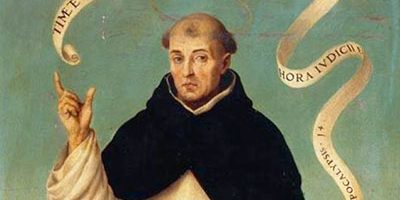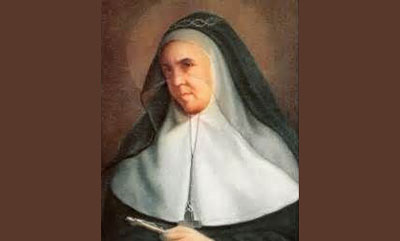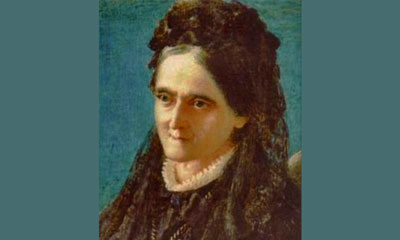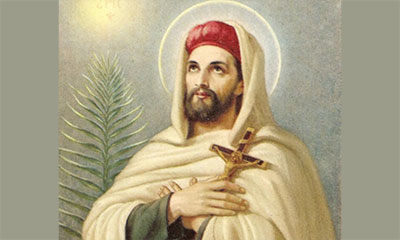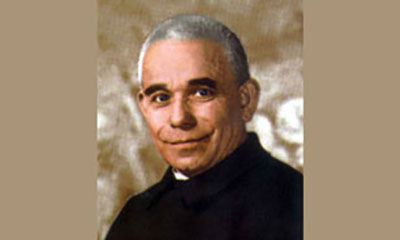June 8, 2018
Saint Vincent Ferrer
Dear Friends,
January 1367. Vincent was seventeen years old when he knocked at the door of the Dominican monastery in Valencia, Spain, to consecrate his life to Christ. He needed no letter of recommendation: his father, Guillem Ferrer, a royal notary of the city, was well known at the monastery. He and his wife, Constanca Mique, were generous to the monks. The miracle that God had performed to signal the child’s special destiny, while the child was still in his mother’s womb, was well remembered in Valencia. When the mother asked a blind woman whom she was aiding to pray for a safe delivery, the poor woman bent her head toward her benefactress’ womb and blessed the child with all her heart. She immediately regained her sight and exclaimed, “Blessed mother! You are carrying an angel who just gave me the light of day!” On January 23, 1350, a boy was born. His parents had him baptized that very day, placing him under the patronage of Saint Vincent, a deacon of Saragossa who was martyred in Valencia around 303.
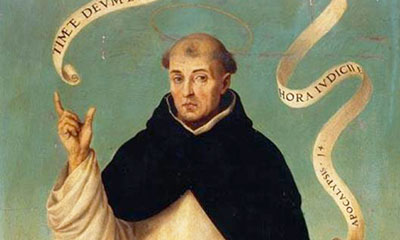 In His mercy, the Lord granted Vincent not only a contemplative spirit to adore Him in the churches and tabernacles where He resides, but He also made him tremble with admiration at the sight of His works in nature, particularly before the immensity of the sea. Spontaneously, he began preaching to his friends. But not all of them were equally inclined to listen to him, and some tried to ridicule him. Seeing him approaching one day, one of them suddenly fell to the ground, and his accomplices began to shout, calling for help. Vincent rushed over; the rascals begged him to perform a miracle on the dying boy’s behalf. Initially surprised, he then looked at them with a calm expression, and gravely told them: “He pretended to be dead for your enjoyment, but unfortunately for him, he is truly dead.” The others burst into laughter mocking Vincent, while shaking their friend so that he could get up. But in vain—the boy was indeed dead! Urged by the sincere supplications of the boys who had meant no harm, Vincent obtained from God the resurrection of the imprudent boy.
In His mercy, the Lord granted Vincent not only a contemplative spirit to adore Him in the churches and tabernacles where He resides, but He also made him tremble with admiration at the sight of His works in nature, particularly before the immensity of the sea. Spontaneously, he began preaching to his friends. But not all of them were equally inclined to listen to him, and some tried to ridicule him. Seeing him approaching one day, one of them suddenly fell to the ground, and his accomplices began to shout, calling for help. Vincent rushed over; the rascals begged him to perform a miracle on the dying boy’s behalf. Initially surprised, he then looked at them with a calm expression, and gravely told them: “He pretended to be dead for your enjoyment, but unfortunately for him, he is truly dead.” The others burst into laughter mocking Vincent, while shaking their friend so that he could get up. But in vain—the boy was indeed dead! Urged by the sincere supplications of the boys who had meant no harm, Vincent obtained from God the resurrection of the imprudent boy.
After his studies, Vincent entered the Dominicans’ novitiate in Valencia. In spite of his genuine vocation, the first years were difficult for him, because the monastery was somewhat lax. However, Father Thomas Carnicer, the novice master, worked towards a return to a fuller observance of the Dominican rule. Under his guidance, Vincent made his profession in 1368. He then pursued studies in theology with great success, moving from “studium” (a monastery dedicated to study) to “studium”: Gerona, Lleida, Majorca, all the way to the “studium generale” in Barcelona, and finally to Toulouse, which for his Order was the summit of the intellectual life. He was ordained a priest in 1378 by Cardinal Pedro de Luna, who was to play a significant role in his life.
“I have heard him preach”
Returning to his native land in 1383, Vincent led an ascetic life while carrying out the duties of a “theologal” (a member of the chapter of the cathedral, charged with teaching theology and some preaching). In 1388, the title of “Master of Theology” (doctoral degree) was conferred on him. Soon his zeal and the success of his preaching aroused jealousy. Malicious men tried to sully the preacher’s moral reputation. They brought an old and debauched man, whom Vincent had often reproved for his licentiousness, to the home of a woman of ill repute, instructing the woman to keep the encounter secret because the man’s name was Vincent Ferrer. The wretched woman lost no time revealing everything to all around her, and scandal broke out in the city. It seemed impossible for the Dominicans to exonerate him. However, during a solemn public assembly, one of the Dominican brothers, pointing to Vincent, asked the woman if she recognized him. “No, he is not the one who told me his name was Vincent Ferrer,” she answered formally. “I know this one, I’ve heard him preach several times. The other one is much older, almost an old man.”
Master Vincent preached a timely message of penance, which the Lord confirmed through the gift of miracles: the acts of Saint Vincent Ferrer’s canonization would mention more than eight hundred miracles, among them numerous resurrections.
Indeed, “So that the submission of our faith might nevertheless be in accordance with reason,” teaches the Catechism of the Catholic Church, “God willed that external proofs of His Revelation should be joined to the internal helps of the Holy Spirit. Thus the miracles of Christ and the Saints … are the most certain signs of divine Revelation, adapted to the intelligence of all; they are motives of credibility which show that the assent of faith is by no means a blind impulse of the mind” (CCC, no. 156).
However, Vincent’s popularity did not engender peace within the monastery, and the exasperated superior forbade him from performing miracles. Docile, the Dominican religiously obeyed. All the same, one day while he was making his way from the monastery to the cathedral, he saw a worker fall from a scaffold. Spontaneously invoking God, he stopped his fall several meters from the ground, then returned to the monastery to ask permission to save the unfortunate man. Touched, the superior allowed him to save him, and withdrew his prohibition.
Two obediences
At this end of the fourteenth century, the Church was experiencing a very grave crisis. In 1378, Pope Urban VI was elected in Rome. But his politics and behavior soon made him odious to most of the cardinals. Some of them, led by Pedro de Luna, declared that his election was invalid, using the excuse of disturbances that had taken place during the conclave. They chose another pope to govern them, who took the name of Clement VII and established his seat in Avignon. So began the Great Western Schism, which would last thirty-nine years. The Church was divided in two: the Roman Obedience, made up primarily of the Italian States, the German Roman Empire, and England, against the Avignon Obedience, which brought together France, Castille, Aragon and Scotland. Historians’ research much later made it possible to establish with certainty that Urban VI was the legitimate Pope. With all those of his native land, Master Vincent rejected in good faith the legitimacy of Urban VI. He had confidence in the opposition cardinals’ judgment, and in Pedro de Luna’s judgment in particular. The Valencian preacher knew nevertheless that there could not be simultaneously two Popes, because there is but one sole Church founded by Jesus Christ. He thought it necessary to research who was the legitimate pope and to obey him, because there is one body and… one faith (Eph. 4:4-5).
On June 19, 2013, Pope Francis reminded us that “being part of the Church means being united to Christ and receiving from Him the divine life that makes us live as Christians; it means staying united to the Pope and to the Bishops who are instruments of unity and communion … How will we have unity among Christians if we are not capable of it among ourselves, as Catholics? Or in our families? So many families fight and are divided! Seek unity, the unity that builds the Church. Unity comes from Jesus Christ. He sends us the Holy Spirit to create unity.”
In 1394, upon the death of the antipope Clement VII, Pedro de Luna was chosen to succeed him, under the condition that he use all means to put an end to the schism, including his own resignation, if need be. He took the name Benedict XIII and summoned Vincent Ferrer to him in Avignon. Not satisfied with having him for his confessor, he appointed him Apostolic Penitentiary and Master of the Sacred Palace. Now one of the most important men in the curia, the Dominican nevertheless refused to don the scarlet, in spite of the express will of the antipope. He soon disapproved of Benedict XIII’s aggressive politics and withdrew from the pontifical palace to the monastery of friar preachers. He nevertheless maintained his support for the Pope in Avignon, for as long as he remained convinced of his legitimacy.
The imminence of the Judgment
His heart broken by the spectacle of schism in the Church, Vincent Ferrer continuously offered his prayers, fasts, and penances so that God might put an end to it, all while faithfully fulfilling his mission as a preacher. Consumed with sorrow, he eventually fell very gravely ill. On October 3, 1398, the third day of his illness, Our Lord appeared to him, in the company of Saint Francis and Saint Dominic, and entrusted to him the mission to go out to preach throughout the world, in imitation of the two great founders, implying that “he would see the merciful results of this preaching before the coming of the antichrist” (letter from Saint Vincent to Benedict XIII). Touching him with His hand, Jesus miraculously cured him, thus confirming the reality of the vision. The Dominican concluded—and he would always remain convinced of this, as other great saints such as Saint Gregory the Great (540-604) have believed in their times—that the final Judgment was imminent. So he proclaimed it often to the people. On November 22, 1399, having obtained permission from Benedict XIII, he left Avignon for a pilgrimage across Europe, which would last until the end of his life. He would cross France, Italy, Spain and Switzerland, to prepare the people for God’s Judgment.
“Before Christ’s second coming,” the Catechism of the Catholic Church reminds us, “the Church must pass through a final trial that will shake the faith of many believers. The persecution that accompanies her pilgrimage on earth will unveil the mystery of iniquity in the form of a religious deception offering men an apparent solution to their problems at the price of apostasy from the truth. The supreme religious deception is that of the Antichrist, a pseudo-messianism by which man glorifies himself in place of God and of His Messiah come in the flesh” (no. 675).
Many people converted by Master Vincent’s preaching attached themselves to him and followed him from town to town. These pilgrims wore a sort of uniform, a white and black habit. A great fraternal charity prevailed among them. The sight of their processions and their exemplary way of life powerfully reinforced the missionary’s preaching. In 1405, he arrived in Genoa. At that time, the Ligurian Republic was ravaged by the plague. Vincent Ferrer organized care for the sick, but also processions of the Blessed Sacrament in the streets. In this cosmopolitan city, where interpreters were always required, his listeners observed for the first time a singular fact—everyone understood the orator’s preaching in their own language at the same time, although wherever he was, he spoke only in his native Catalan dialect or Latin.
To truly follow Jesus
The main focus of the Dominican’s preaching was the reconciliation of souls with God in the sacrament of Penance. In fact, the observation of the law of God (the Ten Commandments) left much to be desired. Vincent Ferrer knew well that “To follow Jesus involves keeping the commandments. The law has not been abolished but man is invited to rediscover it in the Person of the divine Master Who realized it perfectly in Himself, revealed its full meaning and attested to its permanent validity” (Compendium of the CCC, no. 434). “The ‘Ten Words’ point out the conditions of a life freed from the slavery of sin. The Decalogue is a path of life” (CCC, no. 2057). If you would enter life, keep the commandments, Jesus answered to the rich young man (Mt. 19:17). Saint John adds, for this is the love of God, that we keep His commandments. And His commandments are not burdensome (1 Jn. 5:3). Indeed, Jesus is with us every day, He who said, Come to Me, all who labor and are heavy laden, and I will give you rest. … For My yoke is easy, and My burden is light (Mt. 11:28-30). Likewise the Catechism declares, “What God commands He makes possible by His grace” (CCC, no. 2082).
We all need to be reminded of the prospect of the universal judgment: “The message of the Last Judgment calls men to conversion while God is still giving them the acceptable time, … the day of salvation (2 Cor. 6:2). It inspires a holy fear of God and commits them to the justice of the Kingdom of God. It proclaims the blessed hope (Tit. 2:13) of the Lord’s return, when He will come to be glorified in His saints, and to be marveled at in all who have believed (2 Thess. 1:10)” (CCC, no. 1041). Jesus Himself, “Following in the steps of the prophets and John the Baptist … announced the judgment of the Last Day in His preaching. Then will the conduct of each one and the secrets of hearts be brought to light. Then will the culpable unbelief that counted the offer of God’s grace as nothing be condemned. Our attitude about our neighbor will disclose acceptance or refusal of grace and divine love. On the last day Jesus will say: Truly I say to you, as you did it to one of the least of these my brethren, you did it to Me (Mt. 25:40)” (CCC, no. 678).
Vincent Ferrer used simple and ordinary language, full of concrete images. His listeners were not at all scared by the harshness of his words, but they converted, touched by the preacher’s kindness and gentleness. Vincent Ferrer himself advised, “Speak in such a way that your words do not seem to come from a proud and hostile mouth, but from a heart of charity and paternal compassion. Be like a father who takes pity on his culpable children. … Have the heart of a mother who caresses her children.” In Spain, where he arrived in 1409, he worked enthusiastically for the conversion of the Jews to the Catholic faith, fully convinced that Our Lord Jesus Christ was Himself the true fulfillment of the Old Testament. For the preacher, the Jews needed to come to Baptism on their own, and he had a horror of violence towards them. The policies of the Castilian and Aragonian kings that were favorable towards this people had aroused jealousy among the Spanish aristocracy, to the point of giving rise to pogroms (anti-Jewish riots) in Valencia in 1391. Master Vincent declared in no uncertain terms to the responsible parties in Catalonia that “the riots against the Jews are against God Himself”. He himself took advantage of his knowledge of Hebrew and the Talmud to engage in debates with rabbis, filled with his characteristic kindness and free from any polemical passion.
A steady soul
In Murcia, in southern Spain, the indefatigable preacher had, in 1411, to rest his hoarse voice. “God has desired it,” he commented, “so that my many sermons might not inspire in me any vainglory, and that I might not forget that God could take away my voice forever.” And he was glad to be forced to extend his stay in the city “to give to a greater number of souls the opportunity to convert.” Because sometimes, “God Himself,” he had explained to ardent souls, “places an impediment to your efforts for His glory by sending you an illness or something else that suddenly arises. Do not be saddened in the least by this. Receive all things with a steady soul and trust in Him Who knows better than you what is useful to you, and Who works continuously to lift you up to Him, even without your knowing it, provided that you abandon yourself to Him unreservedly.”
However, the schism that divided the Church continued to distress the Dominican. Already in 1407, he had organized a meeting in Savona between Benedict XIII, the Pope in Avignon, and Gregory XII, the Pope in Rome. But because of Pedro de Luna’s obstinacy, nothing came of this meeting. From then on, Vincent Ferrer began to doubt his legitimacy. Moreover, in 1409 he had condemned the Council of Pisa, which had declared the general councils superior to the Pope, and had elected a new antipope, Alexander V, bringing the number of people claiming to be pope to three. While the Council of Constance gathered in 1414 to attempt to resolve the schism, Vincent Ferrer lent his support to the combined efforts of the Emperor Sigismund and the King of Aragon, aimed at forcing Pedro de Luna to resign. But in the face of Benedict XIII’s obstinacy, the Dominican came to formally recognize his illegitimacy, and in 1416, he himself publicly proclaimed his downfall. At last, on November 7, 1417 the Council of Constance ended in the election of Martin V to the Chair of Peter, after the three rivals had resigned or been deposed, thus putting the Great Schism to an end.
Working for peace
From then on, Vincent Ferrer would not leave France again. His wanderings led him from Languedoc, to Auvergne and Bourbonnais, to Lyons, Nevers, Bourges, Angers, Nantes, and Vannes. At the time, the country was devastated by the Hundred Years’ War. The preacher worked to bring peace, not only through his sermons to the people, but also by meeting with the powerful, notably the Dukes of Burgundy and Brittany, as well as the King of England. Yet his health began to deteriorate seriously, and his Catalan companions begged him to return to his native country to spend his final days there. Allowing himself to be persuaded, he set sail for the Iberian Peninsula. But headwinds drove the ship back to Vannes, where the illustrious preacher finished his race on earth, less than ten days later, on April 5, 1419. The bishop had him interred in the choir of his cathedral, but the Valencian Dominicans soon demanded their confrere’s remains. By a decision of Pope Nicholas V, however, his remains would stay in Vannes. Many miracles would occur at his tomb, and Vincent Ferrer was canonized by Pope Callixtus III on June 29, 1455.
“[In] the Gospel of John,” Pope Francis remarked, “it explicitly states that God sent His Son into the world, not to condemn the world, but that the world might be saved through Him. He who believes in Him is not condemned; he who does not believe is condemned already, because he has not believed in the name of the only Son of God” (Jn. 3:17-18). This means, then, that this final judgment is already in progress, it begins now over the course of our lives. Thus judgment is pronounced at every moment of life, as it sums up our faith in the salvation which is present and active in Christ, or of our unbelief, whereby we close in upon ourselves. But if we close ourselves to the love of Jesus, we condemn ourselves. Salvation is to open oneself to Jesus, it is He who saves us. … But for this we must open ourselves to Jesus’ love, which is stronger than all else. Jesus’ love is great, Jesus’ love is merciful, Jesus’ love forgives; but you have to open yourself and to open oneself means to repent, to accuse oneself of the things that are not good and which we have done” (Catechesis of December 11, 2013).
In raising the eyes of an entire generation to the prospect of the divine Judgment, Saint Vincent Ferrer, aided by exceptional gifts for this urgent mission, drew divine mercy on his contemporaries and the whole universe. Jonas’ preaching had saved Nineveh; in a certain respect, Vincent Ferrer’s preaching saved Christianity. Echoing Vincent Ferrer, Saint John Paul II, at the dawn of his pontificate, emphasized Saint John’s words: Children, it is the last hour (1 Jn. 2:18), and reminded us that “in the history of mankind, it is not only Christ who is at work, but also the antichrist (cf. 2 Thess. 2,7). It is necessary that man, every man who feels himself somehow responsible for the super-human threats that weigh on humanity, submits to the judgment of his own conscience, submits to God’s Judgment. … In Him was life, and the life was the light of men. The light shines in the darkness, and the darkness has not overcome it (Jn. 1:4-5)” (Homily of December 31, 1979).


